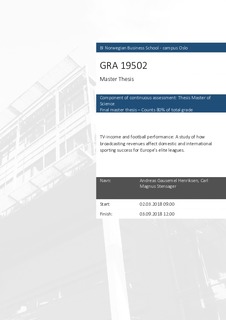TV-income and football performance: A study of how broadcasting revenues affect domestic and international sporting success for Europe’s elite leagues
Abstract
Europe's elite football leagues are often defined by the collective term “the Big
Five”, and consist of clubs originating from England, Spain, Italy, Germany and
France. By dominating both the UEFA Club Coefficient Ranking and Deloitte's
“Football Money League”, the teams from these European leagues win the vast
majority of international tournaments as well as being the most profitable in terms
of revenue generation. While previous research explores the relationship between
total revenue generation and sporting achievements, our paper aims to isolate the
effect of broadcasting revenues, and examine how the income from TV-deals
influences both domestic and international sporting success. By handpicking
information from “the Big Five” leagues across a timespan of seven years (2010-
2017), we built a robust dataset containing thousands of observations. After
running our data through a set of correlation tests and multiple regression models,
we were able to establish positive significant relationships between both
broadcasting revenues and domestic sporting success, and broadcasting revenues
and international sporting success. In fact, as our findings imply broadcasting
revenues to be a weaker success predictor for English teams than for non-English,
the results may indicate that the usage of different broadcasting revenue
distribution models influence sporting achievements. We believe that the uniform
allocation model practiced in England enhances the internal league competition,
making it tougher for one or two teams to dominate the rest. On the other hand,
looking at how the broadcasting revenues are distributed in non-English leagues,
we observe that the skewed allocation fuels a few superior clubs, enabling them to
retain both domestic and international sporting success.
